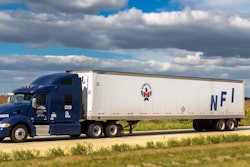
In the wake of the April ruling by the California Supreme Court in the case of decidedly light-duty courier-company Dynamex, there’s been no shortage of trucking-industry hand-wringing over the implications of the California high court’s endorsement of the so-called “ABC test” for determining the validity of a company’s independent contractor relationships.
Applied to a trucking company leasing owner-operators, such a test would favor rulings of employment in the vast majority of cases – and indeed the California court endorsed such favor as a social good. With employee designations, wage and hour rules for employees would apply, thus providing the monetary target for plaintiffs attorneys and any clientele that is both dissatisfied with earnings and places no value on the independent contractor status.
A new judgement in a federal district court, however, interprets the strict ABC employee/contractor test as pre-empted by federal law when it comes to truck transportation, somewhat bucking the April ruling by the California Supreme Court.
As noted by prominent trucking attorney Greg Feary, partner at the Indianapolis-based Scopelitis, Garvin, Light, Hanson & Feary firm, judges in a case involving mostly port drayage drivers contracted to XPO in the federal district court in the Central California District affirmed an argument that the Federal Aviation Administration Authorization Act (F4A) and its prohibition on states enacting laws that affect a motor carrier’s prices, routes or services effectively pre-empted application of the ABC classification test set by the California Supreme Court.

The ABC test “had never been used in California” before the Dynamex case, Feary says. Applied broadly, it could easily result in widespread declines inside California of carrier use of independent contractor owner-operators. The two prominent trucking trade organizations based in California, the Western States Trucking Association and the California Trucking Association, both argue a similar point and have both sued the state of California over the ruling. WSTA and CTA both say that the application of the ABC test doesn’t necessarily convert owner-operators to employees, but rather presents a chilling effect on leasing of single-truck owner-operator businesses by larger carriers.
Federal Ninth Circuit Court of Appeals precedent in the well-known Dilts v. Penske case had established the opposite was the reality when it came to federal pre-emption of California’s state-level wage and hours protections — of most consequence in a raft of subsequent litigation, namely, were the state’s required paid meal and rest breaks for employees.
In the XPO case, Feary explains, “the court further says,” effectively “‘we’re not saying these wage and hour rules are directed at prices, routes or services. We’re saying, the test that was conceived of in Dynamex, that is the thing that impacts prices, routes, and services of a motor carrier. When you use that test, that’s a problem; it is preempted by the F4A – not so the underlying laws.”
For that single case in federal court, thus, the court falls back on a more in-depth, multi-factor test — called colloquially the “Borello test” — to determine whether the independent contractor relationship is a valid one. The single ruling in the XPO case is not precedent-setting; the overall case is still in process, though. Only if it or another of the lawsuits around federal preemption were to reach appeals stage, and be decided on, would precedent against use of the ABC test be set.
Joe Rajkovacz of WSTA, which has one of the ongoing lawsuits in a separate federal court seeking to overturn the Dynamex decision and its ABC test ruling, says that the decision in the XPO case has little bearing on the outcome of their case, at least directly. “We are hopeful our judge adopts the same legal reasoning and doesn’t side with the state and labor and dismiss,” he says.
The U.S. District Court in Northern California heard oral arguments in Western States’ lawsuit in November.
-James Jaillet contributed to this report.











